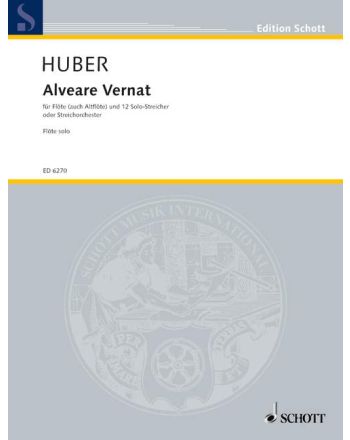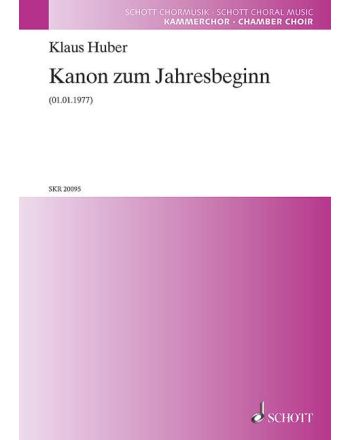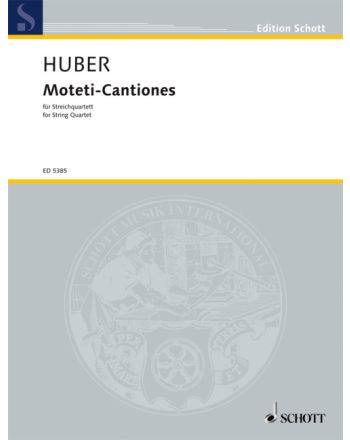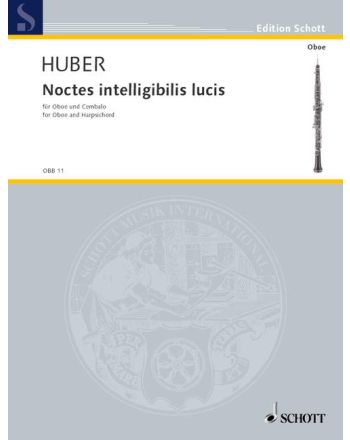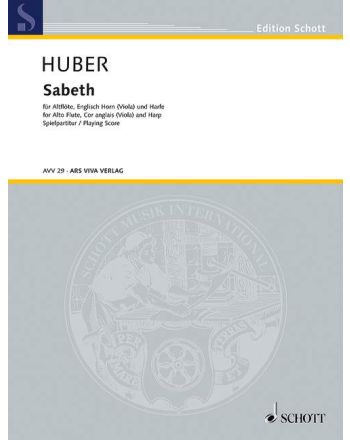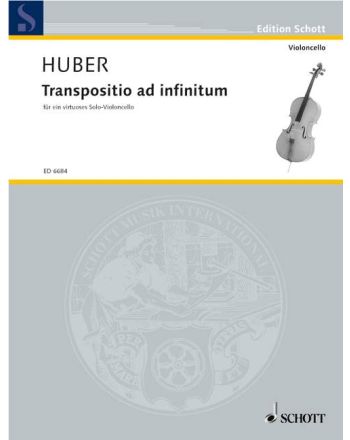
Klaus Huber
À propos de Klaus Huber
Klaus Huber was born in Berne on 30 November 1924. After finishing grammar school in Basle and teacher training in Kusnacht/Zurich, he went to the Zurich Conservatoire (1947-49) to study violin with Stefi Geyer and music education. During this time he also studied theory and composition with Willy Burkhard (1947-55). He continued his studies with Boris Blacher in Berlin in 1955/56, but it wasn’t until 1959 that his international breakthrough came at the IGNM World Music Festival in Rome with the chamber cantata Des Engels Anredung an die Seele.
From 1964-73 Huber taught composition at the Music Academy of Basle. On three occasions (1966, 1968 and 1972) he conducted seminars on composition at the Gaudeamus Foundation in Bilthoven and in 1969 he founded the International Composers' Seminar in Boswil (Switzerland). From 1973 until his retirement in 1991 Huber was chair of composition at the Musikhochschule in Freiburg/Breisgau and director of the Institute of New Music. In addition, he held international visiting professorships, composition classes and residences at renowned institutions.
In 1970 Huber was awarded the Beethoven Prize from the City of Bonn for his orchestral work Tenebrae (1966/67). In 1975 he also received the Composition Award of the Swiss Composers Association, of which he then became President from 1979-82. His other awards include the Arts Prize of the City of Basle (1978), the Premio Italia (1986), the Culture and Peace Award of the Villa Ichon, Bremen (2002) and the Ernst von Siemens Musikpreis (2009).
Huber became a member of the Bavarian Academy of Fine Arts, the Berlin Academy of the Arts, and the Mannheim Free Academy of the Arts, and was an honorary member of the IGNM. He also held an honorary doctorate from the University of Strasbourg.
Schott Music published numerous major works Klaus Huber wrote between the 1950s and 70s, including Inventionen und Choral for orchestra (1956), Noctes for oboe and harpsichord (1961) dedicated to Heinz Holliger, and Moteti-Cantiones (1963), Huber's first work for string quartet.
Both in the orchestral work Tenebrae (1966/67), which makes the natural phenomenon of a solar eclipse appear as a darkening and brightening of orchestral colours, and in the violin concerto Tempora (1970), Huber experimented with the use of quarter-tones and quarter-tone polyphony.
Huber was a socially and politically conscious composer and his music often conveys a humanistic message. Many of his early works were inspired by music from the Christian litany, and in the apocalyptic oratorio …Inwendig…voller Figur (1971) he began openly to express his beliefs. His works often call for an end to human misery, injustice, lack of freedom, intolerance and violence, as in ...Ausgespannt... (1972), ...Ohne Grenze und Rand... for viola and small orchestra (1977) and Erinnere dich an G... for double-bass and 18 instrumentalists (1977). In Turnus for conductor, stage manager, symphony orchestra and tape (1974), Huber addresses the phenomenon of a large-scale orchestra and the social function of the conductor.
For more information, please visit Klaus Huber's website: www.klaushuber.com
Liste d'œuvres
Produits
-
Geistliche Musik in memoriam Kurt Wolfgang SennCompositeur: Klaus HuberMedia Type: Matériel en location / d'exécutionEdition: Matériel d'exécutionLangue: AllemandMatériel en location / d'exécutionMatériel en location / d'exécution
-
für Chorstimmen, Lautsprecher, Tonband und großes OrchesterCompositeur: Klaus HuberMedia Type: Matériel en location / d'exécutionEdition: Matériel d'exécutionLangue: AllemandMatériel en location / d'exécutionMatériel en location / d'exécution
-
auf Texte der Johannes-Apokalypse und von Albrecht DürerCompositeur: Klaus HuberMedia Type: PartitionEdition: Partition d'étudeInstrumentation: choeur mixte (SATB, divisé en plusieur parties) avec solistes, bande magnétique et orchestreLangue: AllemandNuméro du produit: AVV 312Format papierFormat papierEn stock50,00 €TTC, hors expédition
-
für Solo-Kontrabass und 18 InstrumentalistenCompositeur: Klaus HuberMedia Type: Matériel en location / d'exécutionEdition: Matériel d'exécutionMatériel en location / d'exécutionMatériel en location / d'exécution
-
Compositeur: Klaus HuberMedia Type: PartitionEdition: Partie solisteSérie: "Erinnere dich an G..."
Instrumentation: contrebasse et 18 instrumentsNuméro du produit: ED 6953Format papierFormat papierEn stock29,00 €TTC, hors expédition -
für Solo-Kontrabass, 18 Instrumentalisten und Live-ElektronikCompositeur: Klaus HuberMedia Type: Matériel en location / d'exécutionEdition: Matériel d'exécutionMatériel en location / d'exécutionMatériel en location / d'exécution
-
für Viola und kleines OrchesterCompositeur: Klaus HuberMedia Type: Matériel en location / d'exécutionEdition: Matériel d'exécutionMatériel en location / d'exécutionMatériel en location / d'exécution
-
Compositeur: Klaus HuberEdition: Partie solisteSéries: Edition Schott
Alveare Vernat
Instrumentation: flûte (aussi flûte alto) et 12 cordes ou orchestre à cordesNuméro du produit: ED 6270Type de produitEn stockPrix à partir de 14,99 €TTC -
Version für Flöte (auch Altflöte) und 12 StreicherCompositeur: Klaus HuberMedia Type: Matériel en location / d'exécutionEdition: Matériel d'exécutionMatériel en location / d'exécutionMatériel en location / d'exécution
-
für Flöte (auch Altflöte) und StreichorchesterCompositeur: Klaus HuberMedia Type: Matériel en location / d'exécutionEdition: Matériel d'exécutionMatériel en location / d'exécutionMatériel en location / d'exécution
-
Compositeur: Klaus HuberMedia Type: PartitionEdition: Partition d'étudeSérie: Alveare Vernat
Instrumentation: flûte (aussi flûte alto) et 12 cordes ou orchestre à cordesNuméro du produit: ED 5509Format papierFormat papierEn stock24,00 €TTC, hors expédition -
Compositeur: Klaus HuberMedia Type: PartitionEdition: Partition d'exécutionInstrumentation: flûte, violoncelle et pianoNuméro du produit: AVV 44Format papierFormat papierEn stock50,00 €TTC, hors expédition
-
für Streichorchester - 1. FassungCompositeur: Klaus HuberMedia Type: Matériel en location / d'exécutionEdition: Matériel d'exécutionMatériel en location / d'exécutionMatériel en location / d'exécution
-
für Streichorchester - 2. FassungCompositeur: Klaus HuberMedia Type: Matériel en location / d'exécutionEdition: Matériel d'exécutionMatériel en location / d'exécutionMatériel en location / d'exécution
-
Compositeur: Klaus HuberEdition: PartitionSérie: Hiob 19
Instrumentation: choeur mixte (SATB) avec 9 instrumentalistesNuméro du produit: AVV 102Type de produitEn stockPrix à partir de 28,99 €TTC -
für OrchesterCompositeur: Klaus HuberMedia Type: Matériel en location / d'exécutionEdition: Matériel d'exécutionMatériel en location / d'exécutionMatériel en location / d'exécution
-
Dialektische Oper in zwei TeilenCompositeur: Klaus HuberMedia Type: Matériel en location / d'exécutionEdition: Matériel d'exécutionLangue: AllemandMatériel en location / d'exécutionMatériel en location / d'exécution
-
"Wenn eines Jahres Wirken abgeschlossen"Compositeur: Klaus HuberEdition: Partition de choeurSérie: Schott Chamber Choir
Instrumentation: choeur mixte (SATB)Numéro du produit: SKR 20095Type de produitEn stockPrix à partir de 3,99 €TTC -
"Wenn eines Jahres Wirken abgeschlossen"Compositeur: Klaus HuberEdition: Partition de choeurInstrumentation: choeur mixte (SATB)Numéro du produit: ED 6714Type de produitEn stockPrix à partir de 3,99 €TTC
-
Format papierFormat papierEn stock17,00 €TTC, hors expédition
-
Compositeur: Klaus HuberEdition: Partition d'exécutionSérie: Edition Schott
Instrumentation: quatuor à cordesNuméro du produit: ED 5385Type de produitEn stockPrix à partir de 12,99 €TTC -
Compositeur: Klaus HuberSéries: Oboe Library
Edition Schott
Instrumentation: hautbois et clavecinNuméro du produit: OBB 11Type de produitEn stockPrix à partir de 24,99 €TTC -
Compositeur: Klaus HuberEdition: Partition d'exécution, mit eingelegter Viola-StimmeSérie: Edition Schott
Instrumentation: altoflöte, cor anglais (alto) et harpeNuméro du produit: AVV 29Type de produitEn stockPrix à partir de 28,99 €TTC -
Konzert für Violine und OrchesterCompositeur: Klaus HuberMedia Type: Matériel en location / d'exécutionEdition: Matériel d'exécutionMatériel en location / d'exécutionMatériel en location / d'exécution
-
Compositeur: Klaus HuberEdition: Partition d'étudeSéries: Music Of Our Time
Tenebrae
Instrumentation: grand orchestreNuméro du produit: AVV 304Type de produitEn stockPrix à partir de 32,99 €TTC -
für großes OrchesterCompositeur: Klaus HuberMedia Type: Matériel en location / d'exécutionEdition: Matériel d'exécutionMatériel en location / d'exécutionMatériel en location / d'exécution
-
for a virtuoso celloCompositeur: Klaus HuberSérie: Edition Schott
Instrumentation: violoncelleNuméro du produit: ED 6684Type de produitEn stockPrix à partir de 14,99 €TTC -
aus "...inwendig voller figur"Compositeur: Klaus HuberMedia Type: PartitionInstrumentation: voix d'homme (baryton) seuleLangue: Allemand, LatinNuméro du produit: AVV 108Format papierFormat papierEn stock12,00 €TTC, hors expédition
-
für einen Dirigenten, einen Inspizienten, Sinfonieorchester und TonbandCompositeur: Klaus HuberMedia Type: Matériel en location / d'exécutionEdition: Matériel d'exécutionMatériel en location / d'exécutionMatériel en location / d'exécution
-
Compositeur: Klaus HuberMedia Type: PartitionEdition: Jeu de partiesSérie: Zwei Sätze
Instrumentation: 2 trompettes (C), 2 cors, 2 trombones et tubaNuméro du produit: ED 5904Format papierFormat papierEn stock24,00 €TTC, hors expédition -
Compositeur: Klaus HuberMedia Type: PartitionEdition: Partition d'étudeSérie: Zwei Sätze
Instrumentation: 2 trompettes (C), 2 cors, 2 trombones et tubaNuméro du produit: ED 5038Format papierFormat papierEn stock17,00 €TTC, hors expédition





